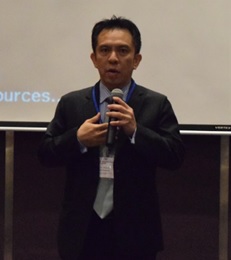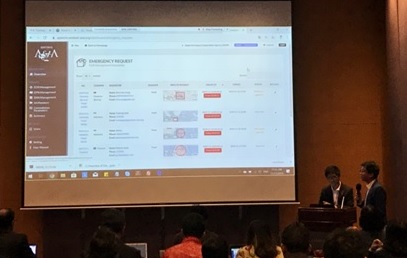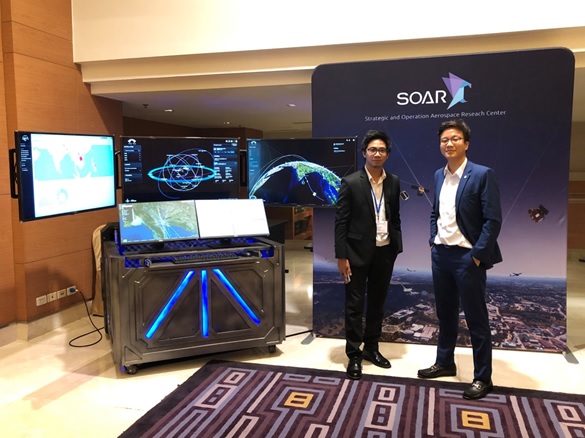Geo-Informatics and Space Technology Development Agency (GISTDA)
In 2019, Sentinel Asia introduced its new disaster data provision system called “Sentinel Asia Step-3 system”. Sentinel Asia Step-3 system is a joint project by GISTDA and NARLabs (NSPO) with Academia Sinica, and JAXA. Its integral component dedicated to Emergency Observation Requests is called the “Operation Planning Tool for Earth-Observation Mission,” or “OPTEMIS”. OPTEMIS was developed by GISTDA. The Sentinel Asia community witnessed the official launch of OPTEMIS during the Joint Project Team Meeting on 12 November 2019, hosted by ADPC in Bangkok, Thailand.
The Sentinel Asia Secretariat interviewed Mr. Wasanchai VONGSANTIVANICH and Mr. Panupat HORMA with the GISTDA OPTEMIS team regarding its development history and the way forward.
 |
 |
| Inauguration Ceremony chaired by Dr. Pakorn Apaphant (GISTDA then- Board of Directors, current Executive Director) |
Training on the use of OPTEMIS (by Mr. Wasanchai VONGSANTIVANICH and Mr. Panupat HORMA) |
Sentinel Asia Secretariat
Could you tell us about your motivation for developing OPTEMIS for the Sentinel Asia community?
GISTDA
About four or five years ago, I was working as satellite systems engineer and had a lot of chances to participate in many meetings and projects among different space agencies in the region. Through those experiences, I came to think that one government could not do everything alone since it is not sustainable in the long run. Satellite is an international platform by itself, even though many emerging space nations spend huge amount of budget for satellite program to mainly monitor their resource domestically, however the satellite orbits and overlooks everywhere around the world. With this fact, it would be great if we could find the optimal and efficient way for different countries to work together and encourage them to share their space resource to be able to use it at full potential. Thus, in GISTDA, I initiated a project to develop a mission planning system for multi-satellite operators whose objective is to create something that functions automatically to collect all factors and make use of satellites resource effectively. After we had finished the first phase of this project, Dr. Chaowalit SILPATHONG, who was our deputy director at that time and was also involved in Sentinel Asia, saw that there were links between our project and Sentinel Asia, so he invited me to the Sentinel Asia meeting. As you know, Sentinel Asia is a regional platform to coordinate and use Earth observation data for disasters in the Asia-Pacific region with the full chain end-to-end members from satellite operators, data analysis nodes up to the users. Coincidentally, what we want to do is to present a way in which people can use space technology more efficiently, so, from this perspective, Sentinel Asia was a great opportunity for us to bring our work to support regional collaborations and to bring the use of space to people which is our main goal. I believe this might also be a part to strengthen national space partnership in the Asia-Pacific. Since then, with the green light from Sentinel Asia steering committee, we have been continuously developing and improving OPTEMIS system to be one of the tools of Sentinel Asia to enhance the collaborations among the members. This is the story behind how and why I started to get involved in Sentinel Asia and OPTEMIS.
Sentinel Asia Secretariat
Have you encountered any challenges in this OPTEMIS project?
GISTDA
Of course, COVID-19 is one of the main challenges for everyone, however with the strong teamwork of Sentinel Asia technical steering committee, we can keep up our efforts and continue our work and improvements for Sentinel Asia at the same pace as before. More importantly, since we are developing IT systems for different national users, we must concern and be careful about cyber security standards and practices. We could say that we have learned a lot and enjoy a lot on working on this project. Despite that GISTDA is now undergoing reorganization and the sponsorship for the project is being paused for a while, our research team is still voluntarily working and eager to continue to contribute to Sentinel Asia. We are fully committed to supporting and being a part to grow this meaningful Sentinel Asia collaboration.
Sentinel Asia Secretariat
How is it like for you to cooperate with Sentinel Asia members on the development of OPTEMIS?
GISTDA
Sentinel Asia technical team (JAXA, NSPO) is like our family, we enjoy a lot working with JAXA, Kawakita-san and his team always provides us kind support. Also, we have a remarkably close partnership with NARLabs/NSPO (Bo Chen, Jer Ling, Eric and Eddy) on the development of OPTEMIS and learned a lot from them. However, I would like to add that we feel close and eager to work with everyone in Sentinel Asia. Sentinel Asia community is fantastic and we feel like everyone is caring for each other, this might be because the aim of Sentinel Asia is to work together to support disaster relief. It is obvious from many past experiences that Sentinel Asia could be the first steppingstone and this great collaborative scheme could continue and extend to other domains as well.
Sentinel Asia Secretariat
Now every Sentinel Asia member uses your system.
GISTDA
We are immensely proud and keen to continue to contribute to Sentinel Asia, trying to bring space closer to people and to bring technology to help people. That is one of our motivations to improve OPTEMIS.
Sentinel Asia Secretariat
Do you have any future plans for OPTEMIS?
GISTDA
Data Provider Nodes (DPNs) and Data Analysis Nodes (DAN) are already using the system and we continuously develop and improve according to their comments and recommendations. For future modules, I think there are still rooms to improve, and we will be able to make it better. One thing we want to improve is to expand the benefit to people in affected areas and to enhance satellite data with more useful information. We are now considering a project implementing more sensors, including drones, and crowd-sourcing data for disaster management. We have tried this in Thailand for wildfire applications, and if this is successful, we are willing to contribute and open it to every member. This is a matter of data fusion and AI, so it might be beyond Sentinel Asia, but this is very interesting point for us because satellite data on its own is sometimes not enough.
Sentinel Asia Secretariat
How would you like to enhance the collaboration with Sentinel Asia in the future?
GISTDA
We believe that the more effectively and timely Sentinel Asia provides information for assists disaster response in the affected area, the stronger the community it will be. For our part, we could potentially assist in terms of providing a useful multilateral platform to support everyone to work together closely and dynamically. In addition to the good collaboration, we should consider making this community sustainable, this could be done through getting involve participation from every member to make Sentinel Asia community strong in the long run.
